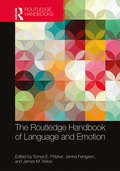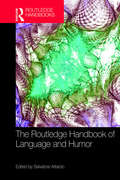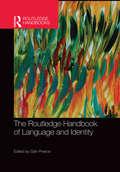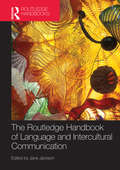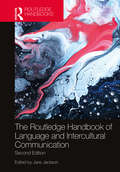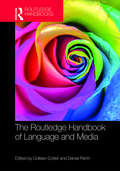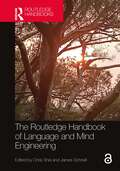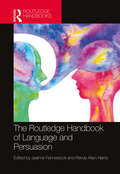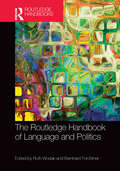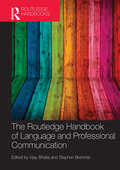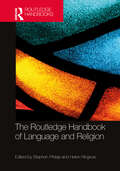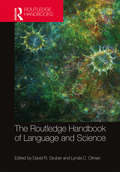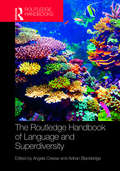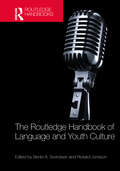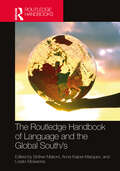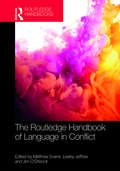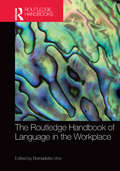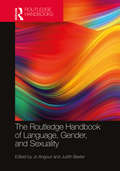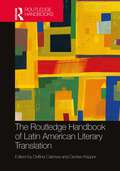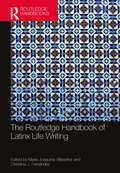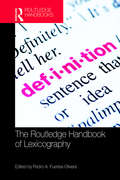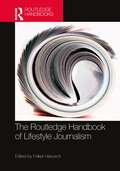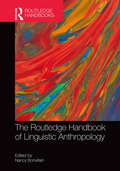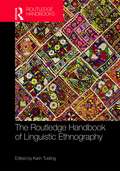- Table View
- List View
The Routledge Handbook of Language and Emotion (Routledge Handbooks in Linguistics)
by Sonya E. Pritzker Janina Fenigsen James M. WilceThe Routledge Handbook of Language and Emotion offers a variety of critical theoretical and methodological perspectives that interrogate the ways in which ideas about and experiences of emotion are shaped by linguistic encounters, and vice versa. Taking an interdisciplinary approach which incorporates disciplines such as linguistic anthropology, sociolinguistics, applied linguistics, psychology, communication studies, education, sociology, folklore, religious studies, and literature, this book: explores and illustrates the relationship between language and emotion in the five key areas of language socialisation; culture, translation and transformation; poetry, pragmatics and power; the affective body-self; and emotion communities; situates our present-day thinking about language and emotion by providing a historical and cultural overview of distinctions and moral values that have traditionally dominated Western thought relating to emotions and their management; provides a unique insight into the multiple ways in which language incites emotion, and vice versa, especially in the context of culture. With contributions from an international range of leading and emerging scholars in their fields, The Routledge Handbook of Language and Emotion is an indispensable resource for students and researchers who are interested in incorporating interdisciplinary perspectives on language and emotion into their work.
The Routledge Handbook of Language and Humor (Routledge Handbooks in Linguistics)
by Salvatore AttardoThe Routledge Handbook of Language and Humor presents the first ever comprehensive, in-depth treatment of all the sub-fields of the linguistics of humor, broadly conceived as the intersection of the study of language and humor. The reader will find a thorough historical, terminological, and theoretical introduction to the field, as well as detailed treatments of the various approaches to language and humor. Deliberately comprehensive and wide-ranging, the handbook includes chapter-long treatments on the traditional topics covered by language and humor (e.g., teasing, laughter, irony, psycholinguistics, discourse analysis, the major linguistic theories of humor, translation) but also cutting-edge treatments of internet humor, cognitive linguistics, relevance theoretic, and corpus-assisted models of language and humor. Some chapters, such as the variationist sociolinguistcs, stylistics, and politeness are the first-ever syntheses of that particular subfield. Clusters of related chapters, such as conversation analysis, discourse analysis and corpus-assisted analysis allow multiple perspectives on complex trans-disciplinary phenomena. This handbook is an indispensable reference work for all researchers interested in the interplay of language and humor, within linguistics, broadly conceived, but also in neighboring disciplines such as literary studies, psychology, sociology, anthropology, etc. The authors are among the most distinguished scholars in their fields.
The Routledge Handbook of Language and Identity (Routledge Handbooks in Applied Linguistics)
by Sian PreeceThe Routledge Handbook of Language and Identity provides a clear and comprehensive survey of the field of language and identity from an applied linguistics perspective. Forty-one chapters are organised into five sections covering: theoretical perspectives informing language and identity studies key issues for researchers doing language and identity studies categories and dimensions of identity identity in language learning contexts and among language learners future directions for language and identity studies in applied linguistics Written by specialists from around the world, each chapter will introduce a topic in language and identity studies, provide a concise and critical survey, in which the importance and relevance to applied linguists is explained and include further reading. The Routledge Handbook of Language and Identity is an essential purchase for advanced undergraduate and postgraduate students of Linguistics, Applied Linguistics and TESOL. Advisory board: David Block (Institució Catalana de Recerca i Estudis Avançats/ Universitat de Lleida, Spain); John Joseph (University of Edinburgh); Bonny Norton (University of British Colombia, Canada).
The Routledge Handbook of Language and Intercultural Communication (Routledge Handbooks in Applied Linguistics)
by Jane JacksonThe Routledge Handbook of Language and Intercultural Communication constitutes a comprehensive introduction to the multidisciplinary field of intercultural communication, drawing on the expertise of leading scholars from diverse backgrounds. The Handbook is structured in five sections and covers historical perspectives, core issues and topics, and new debates in the field, with a particular focus on the language dimension. Among the key themes addressed are: the foundation of intercultural communication; core themes and issues; putting intercultural communication theory into practice; new debates and future directions. The Handbook includes an introduction and overview by the editor, which provides readers with an indication of the focus of each section and chapter. The Routledge Handbook of Language and Intercultural Communication is the ideal resource for advanced undergraduates and postgraduate students of applied linguistics, TESOL/TEFL and communication studies.
The Routledge Handbook of Language and Intercultural Communication (Routledge Handbooks in Applied Linguistics)
by Jane JacksonThe Routledge Handbook of Language and Intercultural Communication provides a comprehensive historical survey of language and intercultural communication studies with a critical assessment of past and present theory, research, and practice, as well as an insight into future directions. Drawing on the expertise of leading scholars from diff erent parts of the world, this second edition offers updated chapters by returning authors and many new contributions on a broad range of topics, including reflexivity and criticality, translanguaging, and social justice in relation to intercultural communication. With an emphasis on contemporary, critical perspectives, this handbook showcases the varied range of issues, perspectives, and approaches that characterise this increasingly important field in today’s globalised world. Offering 34 chapters with examples from a variety of languages and international settings, this handbook is an indispensable resource for students and scholars working in the fields of intercultural communication, applied linguistics, TESOL/ TEFL, and communication studies.
The Routledge Handbook of Language and Media
by Colleen Cotter Daniel PerrinThe Routledge Handbook of Language and Media provides an accessible and comprehensive overview of state-of-the-art research in media linguistics. This handbook analyzes both language theory and practice, demonstrating the vital role of this research in understanding language use in society. With over thirty chapters contributed by leading academics from around the world, this handbook: addresses issues of language use, form, structure, ideology, practice, and culture in the context of both traditional and new communication media; investigates mediated language use in public spheres, organizations, and personal communication, including newspaper journalism, broadcasting, and social media; examines the interplay of language and media from both linguistic and media perspectives, discussing auditory and visual media and graphic modes, as well as language and gender, multilingualism, and language change; analyzes the advantages and shortcomings of current approaches within media linguistics research and outlines avenues for future research. The Routledge Handbook of Language and Media is a must-have survey of this key field, and is essential reading for those interested in media linguistics.
The Routledge Handbook of Language and Mind Engineering
by Chris Shei James SchnellThe Routledge Handbook of Language and Mind Engineering is a comprehensive work that delves into the complex interplay between language, culture, politics, and media in shaping the human mind.The book is divided into five main sections, each exploring different aspects of mind engineering: I. Political Mind Engineering; II. Commercial Mind Engineering; III. Media, Culture, and Mind Engineering; IV. Linguistic and Semiotic Analysis of Mind Engineering; V. Mind Engineering in Educational Settings.The book provides a multi-dimensional perspective on how language, media, culture, and politics intersect to shape individuals' thoughts and beliefs. It highlights the diverse methods and contexts in which mind engineering occurs, making it a valuable resource for scholars, researchers, and policymakers interested in understanding the complexities of contemporary discourse and manipulation of human thought.The contents of this cutting-edge handbook will engage all undergraduate, postgraduate, PhD students and scholars, and researchers at all levels, in fields such as languages, linguistics, politics, communication studies, media studies, and psychology.Chapter 15 of this book is freely available as a downloadable Open Access PDF at http://www.taylorfrancis.com under a Creative Commons Attribution (CC-BY) International license.Chapter 17 of this book is freely available as a downloadable Open Access PDF at http://www.taylorfrancis.com under a Creative Commons Attribution‑Non Commercial‑No Derivatives (CC‑BY‑NC‑ND) 4.0 license.Chapter 18 of this book is freely available as a downloadable Open Access PDF at http://www.taylorfrancis.com under a Creative Commons Attribution-Non Commercial-No Derivatives (CC-BY-NC-ND) 4.0 license.
The Routledge Handbook of Language and Persuasion (Routledge Handbooks in Linguistics)
by Randy Allen Harris Jeanne FahnestockThis handbook provides a wide-ranging, authoritative, and cutting-edge overview of language and persuasion. Featuring a range of international contributors, the handbook outlines the basic materials of linguistic persuasion – sound, words, syntax, and discourse – and the rhetorical basics that they enable, such as appeals, argument schemes, arrangement strategies, and accommodation devices. After a comprehensive introduction that brings together the elements of linguistics and the vectors of rhetoric, the handbook is divided into six parts. Part I covers the basic rhetorical appeals to character, the emotions, argument schemes, and types of issues that constitute persuasion. Part II covers the enduring effects of persuasive language, from humor to polarization, while a special group of chapters in Part III examines figures of speech and their rhetorical uses. In Part IV, contributors focus on different fields and genres of argument as entry points for research into conventions of arguing. Part V examines the evolutionary and developmental roots of persuasive language, and Part VI highlights new computational methods of language analysis. This handbook is essential reading for those researching and studying persuasive language in the fields of linguistics, rhetoric, argumentation, communication, discourse studies, political science, psychology, digital studies, mass media, and journalism.
The Routledge Handbook of Language and Politics (Routledge Handbooks in Linguistics)
by Ruth Wodak and Bernhard ForchtnerThe Routledge Handbook of Language and Politics provides a comprehensive overview of this important and dynamic area of study and research. Language is indispensable to initiating, justifying, legitimatising and coordinating action as well as negotiating conflict and, as such, is intrinsically linked to the area of politics. With 45 chapters written by leading scholars from around the world, this Handbook covers the following key areas: Overviews of the most influential theoretical approaches, including Bourdieu, Foucault, Habermas and Marx; Methodological approaches to language and politics, covering – among others – content analysis, conversation analysis, multimodal analysis and narrative analysis; Genres of political action from speech-making and policy to national anthems and billboards; Cutting-edge case studies about hot-topic socio-political phenomena, such as ageing, social class, gendered politics and populism. The Routledge Handbook of Language and Politics is a vibrant survey of this key field and is essential reading for advanced students and researchers studying language and politics.
The Routledge Handbook of Language and Professional Communication (Routledge Handbooks in Applied Linguistics)
by Stephen Bremner Vijay BhatiaThe Routledge Handbook of Language and Professional Communication provides a broad coverage of the key areas where language and professional communication intersect and gives a comprehensive account of the field. The four main sections of the Handbook cover: Approaches to Professional Communication Practice Acquisition of Professional Competence Views from the Professions This invaluable reference book incorporates not only an historical view of the field, but also looks to possible future developments. Contributions from international scholars and practitioners, focusing on specific issues, explore the major approaches to professional communication and bring into focus recent research. This is the first handbook of language and professional communication to account for both pedagogic and practitioner perspectives and as such is an essential reference for postgraduate students and those researching and working in the areas of applied linguistics and professional communication.
The Routledge Handbook of Language and Religion (Routledge Handbooks in Linguistics)
by Stephen PihlajaThe Routledge Handbook of Language and Religion is the first ever comprehensive collection of research on religion and language, with over 35 authors from 15 countries, presenting a range of linguistic and discourse analytic research on religion and belief in different discourse contexts. The contributions show the importance of studying language and religion and for bringing together work in this area across sub-disciplines, languages, cultures, and geographical boundaries. The Handbook focuses on three major topics: Religious and Sacred Language, Institutional Discourse, and Religious Identity and Community. Scholars from a variety of different disciplinary backgrounds investigate these topics using a range of linguistic perspectives including Cognitive Linguistics, Discourse Analysis, Sociolinguistics, Pragmatics, and Conversation Analysis. The data analysed in these chapters come from a variety of religious backgrounds and national contexts. Linguistic data from all the major world religions are included, with sacred texts, conversational data, and institutional texts included for analysis. The Handbook is intended to be useful for readers from different subdisciplines within linguistics, but also to researchers working in other disciplines including philosophy, theology, and sociology. Each chapter gives both a template for research approaches and suggestions for future research and will inspire readers at every stage of their career.
The Routledge Handbook of Language and Science (Routledge Handbooks in Linguistics)
by Lynda C. Olman David R. GruberThe Routledge Handbook of Language and Science provides a state-of-the-art volume on the language of scientific processes and communications. This book offers comprehensive coverage of socio-cultural approaches to science, as well as analysing new theoretical developments and incorporating discussions about future directions within the field. Featuring original contributions from an international range of renowned scholars, as well as academics at the forefront of innovative research, this handbook: identifies common objects of inquiry across the areas of rhetoric, sociolinguistics, communication studies, science and technology studies, and public understanding of science covers the four key themes of power, pedagogy, public engagement, and materiality in relation to the study of scientific language and its development uses qualitative and quantitative approaches to demonstrate how humanities and social science scholars can go about studying science details the meaning and purpose of socio-cultural approaches to science, including the impact of new media technologies analyses the history of the field and how it positions itself in relation to other areas of study Ushering the study of language and science toward a more interdisciplinary, diverse, communal and ecological future, The Routledge Handbook of Language and Science is an essential reference for anyone with an interest in this area.
The Routledge Handbook of Language and Science (Routledge Handbooks in Linguistics)
by R. Gruber Lynda C. OlmanThe Routledge Handbook of Language and Science provides a state-of-the-art volume on the language of scientific processes and communications. This book offers comprehensive coverage of socio-cultural approaches to science, as well as analysing new theoretical developments and incorporating discussions about future directions within the field. Featuring original contributions from an international range of renowned scholars, as well as academics at the forefront of innovative research, this handbook: identifies common objects of inquiry across the areas of rhetoric, sociolinguistics, communication studies, science and technology studies, and public understanding of science; covers the four key themes of power, pedagogy, public engagement, and materiality in relation to the study of scientific language and its development; uses qualitative and quantitative approaches to demonstrate how humanities and social science scholars can go about studying science; details the meaning and purpose of socio-cultural approaches to science, including the impact of new media technologies; analyses the history of the field and how it positions itself in relation to other areas of study. Ushering the study of language and science toward a more interdisciplinary, diverse, communal and ecological future, The Routledge Handbook of Language and Science is an essential reference for anyone with an interest in this area.
The Routledge Handbook of Language and Superdiversity (Routledge Handbooks in Applied Linguistics)
by Angela Creese Adrian BlackledgeThe Routledge Handbook of Language and Superdiversity provides an accessible and authoritative overview of this growing area, the linguistic analysis of interaction in superdiverse cities. Developed as a descriptive term to account for the increasingly stratified processes and effects of migration in Western Europe, ‘superdiversity’ has the potential to contribute to an enhanced understanding of mobility, complexity, and change, with theoretical, practical, global, and methodological reach. With seven sections edited by leading names, the handbook includes 35 state-of-the art chapters from international authorities. The handbook adopts a truly interdisciplinary approach, covering: Cultural heritage Sport Law Education Business and entrepreneurship. The result is a truly comprehensive account of how people live, work and communicate in superdiverse spaces. This volume is key reading for all those engaged in the study and research of Language and Superdiversity within Applied Linguistics, Linguistic Anthropology and related areas.
The Routledge Handbook of Language and Youth Culture (Routledge Handbooks in Applied Linguistics)
by Bente A. Svendsen and Rickard JonssonThe Routledge Handbook of Language and Youth Culture offers the first essential grounding of critical youth studies within sociolinguistic research. Young people are often seen to be at the frontline of linguistic creativity and pioneering communicative technologies. Their linguistic practices are considered a primary means of exploring linguistic change as well as the role of language in social life, such as how language and identity, ideology and power intersect. Bringing together leading and cutting-edge perspectives from thought leaders across the globe, this handbook: • addresses how young people’s cultural practices, as well as forces like class, gender, ethnicity and race, influence language • considers emotions, affect, age and ageism, materiality, embodiment and the political youth, as well as processes of unmooring language and place • critically reflects on our understandings of terms such as ‘language’, ‘youth’ and ‘culture’, drawing on insights from youth studies to help contextualise age within power dynamics • features examples from a wide range of linguistic contexts such as social media and the classroom, as well as expressions such as graffiti, gestures and different musical genres including grime and hip-hop. Providing important insights into how young people think, feel, act, and communicate in the complexity of a polarised world, The Routledge Handbook of Language and Youth Culture is an invaluable resource for advanced students and researchers in disciplines including sociolinguistics, linguistic anthropology, multilingualism, youth studies and sociology.
The Routledge Handbook of Language and the Global South/s (Routledge Handbooks in Applied Linguistics)
by Sinfree Makoni Anna Kaiper-Marquez Lorato MokwenaThis Handbook centers on language(s) in the Global South/s and the many ways in which both "language" and the "Global South" are conceptualized, theorized, practiced, and reshaped. Drawing on 31 chapters situated in diverse geographical contexts, and four additional interviews with leading scholars, this text showcases: Issues of decolonization Promotion of Southern epistemologies and theories of the Global South/s A focus on social/applied linguistics An added focus on the academy A nuanced understanding of global language scholarship. It is written for emerging and established scholars across the globe as it positions Southern epistemologies, language scholarship, and decolonial theories into scholarship surrounding multiple themes and global perspectives.
The Routledge Handbook of Language in Conflict (Routledge Handbooks in Applied Linguistics)
by Lesley Jeffries Matthew Evans Jim O'DriscollThe Routledge Handbook of Language in Conflict presents a range of linguistic approaches as a means for examining the nature of communication related to conflict. Divided into four sections, the Handbook critically examines text, interaction, languages and applications of linguistics in situations of conflict. Spanning 30 chapters by a variety of international scholars, this Handbook: includes real-life case studies of conflict and covers conflicts from a wide range of geographical locations at every scale of involvement (from the personal to the international), of every timespan (from the fleeting to the decades-long) and of varying levels of intensity (from the barely articulated to the overtly hostile) sets out the textual and interactional ways in which conflict is engendered and in which people and groups of people can be set against each other considers what linguistic research has brought, and can bring, to the universal aim of minimising the negative effects of outbreaks of conflict wherever and whenever they occur. The Routledge Handbook of Language in Conflict is an essential reference book for students and researchers of language and communication, linguistics, peace studies, international relations and conflict studies.
The Routledge Handbook of Language in the Workplace (Routledge Handbooks in Applied Linguistics)
by Bernadette VineThe Routledge Handbook of Language in the Workplace provides a comprehensive survey of linguistic research on language in the workplace written by top scholars in the field from around the world. The Handbook covers theoretical and methodological approaches, explores research in different types of workplace settings, and examines some key areas of workplace talk that have been investigated by workplace researchers. Issues of identity have become a major focus in recent workplace research and the Handbook highlights some core issues of relevance in this area, such as gender, leadership, and intercultural communication. As the field has developed, applications of workplace research for both native and non-native speakers have emerged. Insights can inform and improve input from practitioners training workers in a range of fields and across a variety of contexts, and the Handbook foregrounds some of the ways workplace research can do this. This is an invaluable resource for researchers and graduate students interested in learning more about workplace discourse.
The Routledge Handbook of Language, Gender, and Sexuality (Routledge Handbooks in Applied Linguistics)
by Jo Angouri and Judith BaxterThe Routledge Handbook of Language, Gender, and Sexuality provides an accessible and authoritative overview of this dynamic and growing area of research. Covering cutting-edge debates in eight parts, it is designed as a series of mini edited collections, enabling the reader, and particularly the novice reader, to discover new ways of approaching language, gender, and sexuality. With a distinctive focus both on methodologies and theoretical frameworks, the Handbook includes 40 state-of-the art chapters from international authorities. Each chapter provides a concise and critical discussion of a methodological approach, an empirical study to model the approach, a discussion of real-world applications, and further reading. Each section also contains a chapter by leading scholars in that area, positioning, through their own work and chapters in their part, current state-of-the-art and future directions. This volume is key reading for all engaged in the study and research of language, gender, and sexuality within English language, sociolinguistics, discourse studies, applied linguistics, and gender studies.
The Routledge Handbook of Latin American Literary Translation (Routledge Handbooks in Translation and Interpreting Studies)
by Denise Kripper Delfina CabreraThe Routledge Handbook of Latin American Literary Translation offers an understanding of translation in Latin America both at a regional and transnational scale. Broad in scope, it is devoted primarily to thinking comprehensively and systematically about the intersection of literary translation and Latin American literature, with a curated selection of original essays that critically engage with translation theories and practices outside of hegemonic Anglo centers. In this introductory volume, through survey and case-study chapters, contributing authors cover literary and cultural translation in the region historically, geographically, and linguistically. From the nineteenth to the twenty-first century, the chapters focus on issues ranging from the role of translation in the construction of national identities to the challenges of translation in the current digital age. Areas of interest expand from the United States to the Southern Cone, including the Caribbean and Brazil, as well as the impact of Latin American literature internationally, and paying attention to translation from and to indigenous languages; Portuguese, English, French, German, Chinese, Spanglish, and more. The first of its kind in English, this Handbook will shed light on different translation approaches and invite a rethinking of intercultural and interlingual exchanges from Latin American viewpoints. This is key reading for all scholars, researchers, and students of literary translation studies, Latin American literature, and comparative literature.
The Routledge Handbook of Latinx Life Writing (Routledge Literature Handbooks)
by Maria Joaquina VillaseñorThe Routledge Handbook of Latinx Life Writing provides an in‑depth introduction to Latinx life writing, taking a historical approach to the study of a variety of key Latinx life writers, genres, and thematic concerns. This volume includes chapters on fundamental genres of Latinx life writing including memoir, autobiography, oral history, testimonio, comics and graphic texts, poetry of protest, and theatre to more fully depict the breadth, dynamism, and vibrancy of Latinx life writing. Latinx people continuously engaged in the empowering act of telling their stories and narrating their lives, producing writing that at various times and in various ways expressed their joy, expressed their rage and anguish, and ultimately, asserted their subjectivity all the while indelibly contributing to the American literary landscape.
The Routledge Handbook of Lexicography (Routledge Handbooks in Linguistics)
by Pedro A. Fuertes-OliveraThe Routledge Handbook of Lexicography provides a comprehensive overview of the major approaches to lexicography and their applications within the field. This Handbook features key case studies and cutting-edge contributions from an international range of practitioners, teachers, and researchers. Analysing the theory and practice of compiling dictionaries within the digital era, the 47 chapters address the core issues of: The foundations of lexicography, and its interactions with other disciplines including Corpus Linguistics and Information Science; Types of dictionaries, for purposes such as translation and teaching; Innovative specialised dictionaries such as the Oenolex wine dictionary and the Online Dictionary of New Zealand Sign Language; Lexicography and world languages, including Arabic, Hindi, Russian, Chinese, and Indonesian; The future of lexicography, including the use of the Internet, user participation, and dictionary portals. The Routledge Handbook of Lexicography is essential reading for researchers and students working in this area.
The Routledge Handbook of Lifestyle Journalism (Routledge Media and Cultural Studies Handbooks)
by John Hartley Sarah Lonsdale Folker Hanusch Elfriede Fürsich Stephanie Alice Baker Carsten Stage Rob Sharp Renita Coleman Agnès Rocamora Geoffrey Craig Myles Ethan Lascity Lucia Vodanovic Johana Kotišová Sumana Kasturi Ben Cocking Bethany Usher Peter English Joy Jenkins Nete Nørgaard Kristensen Unni From Maarit Jaakkola Tisha Dejmanee Gregory P. Perreault Elizabeth Fakazis Avery E. Holton Anuja Premika Daniel Nölleke Sandra Banjac Annik Dubied David Fleischman Ella Hackett Aly Hill Phoebe Maares Nhamo Anthony Mhiripiri Nilüfer Türksoy Mariah L. WellmanTaking stock of research in an area that has long been starved of scholarly attention, The Routledge Handbook of Lifestyle Journalism brings together scholars from across journalism, communication, and media studies to offer the first substantial volume of its kind in this dynamic field.This Handbook is divided into five major sections covering definitions; current trends; the relationship between lifestyle journalism and consumer culture; how lifestyle journalism interacts with matters of identity, emotion, politics, and society; and future directions. Featuring 30 contributions from authors at the cutting-edge of research around the world, each chapter provides an authoritative overview of key literature and debates and proposes a way forward for future scholarship.The Routledge Handbook of Lifestyle Journalism is an essential companion for advanced students and researchers of lifestyle journalism and related beats including food, fashion, and travel writing.
The Routledge Handbook of Linguistic Anthropology (Routledge Handbooks in Linguistics)
by Nancy BonvillainThe Routledge Handbook of Linguistic Anthropology is a broad survey of linguistic anthropology, featuring contributions from prominent scholars in the field. Each chapter presents a brief historical summary of research in the field and discusses topics and issues of current concern to people doing research in linguistic anthropology. The handbook is organized into four parts – Language and Cultural Productions; Language Ideologies and Practices of Learning; Language and the Communication of Identities; and Language and Local/Global Power – and covers current topics of interest at the intersection of the two fields, while also contextualizing them within discussions of fieldwork practice. Featuring 30 contributions from leading scholars in the field, The Routledge Handbook of Linguistic Anthropology is an essential overview for students and researchers interested in understanding core concepts and key issues in linguistic anthropology.
The Routledge Handbook of Linguistic Ethnography (Routledge Handbooks in Applied Linguistics)
by Karin TustingThe Routledge Handbook of Linguistic Ethnography provides an accessible, authoritative and comprehensive overview of this growing body of research, combining ethnographic approaches with close attention to language use. This handbook illustrates the richness and potential of linguistic ethnography to provide detailed understandings of situated patterns of language use while connecting these patterns clearly to broader social structures. Including a general introduction to linguistic ethnography and 25 state-of-the-art chapters from expert international scholars, the handbook is divided into three sections. Chapters cover historical, empirical, methodological and theoretical contributions to the field, and new approaches and developments. This handbook is key reading for those studying linguistic ethnography, qualitative research methods, sociolinguistics and educational linguistics within English Language, Applied Linguistics, Education and Anthropology.
